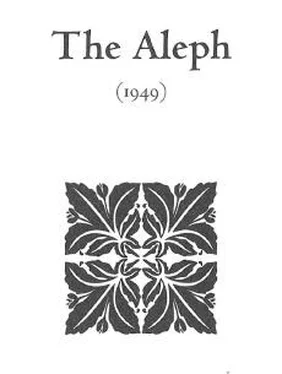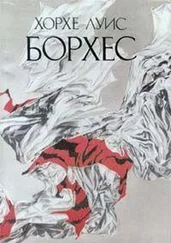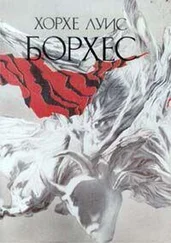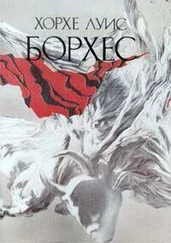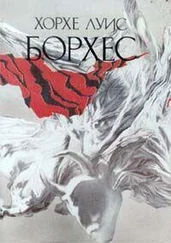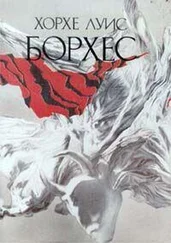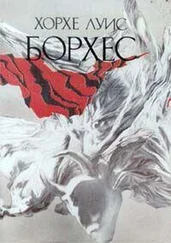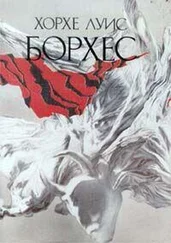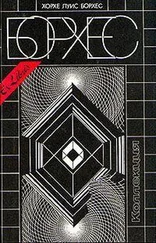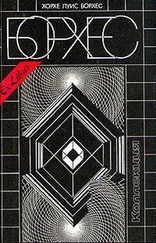Хорхе Борхес - Collected Fictions
Здесь есть возможность читать онлайн «Хорхе Борхес - Collected Fictions» весь текст электронной книги совершенно бесплатно (целиком полную версию без сокращений). В некоторых случаях можно слушать аудио, скачать через торрент в формате fb2 и присутствует краткое содержание. Год выпуска: 1999, ISBN: 1999, Издательство: Penguin (UK), Жанр: Старинная литература, на английском языке. Описание произведения, (предисловие) а так же отзывы посетителей доступны на портале библиотеки ЛибКат.
- Название:Collected Fictions
- Автор:
- Издательство:Penguin (UK)
- Жанр:
- Год:1999
- ISBN:9780140286809
- Рейтинг книги:5 / 5. Голосов: 1
-
Избранное:Добавить в избранное
- Отзывы:
-
Ваша оценка:
- 100
- 1
- 2
- 3
- 4
- 5
Collected Fictions: краткое содержание, описание и аннотация
Предлагаем к чтению аннотацию, описание, краткое содержание или предисловие (зависит от того, что написал сам автор книги «Collected Fictions»). Если вы не нашли необходимую информацию о книге — напишите в комментариях, мы постараемся отыскать её.
Collected Fictions — читать онлайн бесплатно полную книгу (весь текст) целиком
Ниже представлен текст книги, разбитый по страницам. Система сохранения места последней прочитанной страницы, позволяет с удобством читать онлайн бесплатно книгу «Collected Fictions», без необходимости каждый раз заново искать на чём Вы остановились. Поставьте закладку, и сможете в любой момент перейти на страницу, на которой закончили чтение.
Интервал:
Закладка:
The last word we have of Melancthon is that the wizard and one of the men without a face carried him out to the sand dunes, where he is now a servant to demons.
(From Emanuel Swedenborg, Arcana Cœlestia)*
THE CHAMBER OF STATUES
In the early days, there was a city in the kingdom of the Andalusians where their monarchs lived and its name was Labtayt or Ceuta, or Jaén. In that city, there was a strong tower whose gate (of two portals breadth) was neither for going in nor for coming out, but for keeping closed. And whenever a King died and another King took the Kingship after him, with his own hands, he set a new and strong lock to that gate, till there were four-and-twenty locks upon the tower, according to the number of Kings. After this time, there came to the throne an evil man, who was not of the old royal house, and instead of setting a new lock, he had a mind to open these locks, that he might see what was within the tower. The grandees of his kingdom forbade him this and pressed him to desist and reproved him and blamed him; they hid from him the iron key ring and told him that it was much easier to add a new lock to the gate than to force four-and-twenty, but he persisted, saying, "Needs must this place be opened." Then they offered him all that their hands possessed of monies and treasures and things of price, of flocks, of Christian idols, of gold and silver, if he would but refrain; still, he would not be baulked, and said "There is no help for it but I open this tower." So he pulled off the locks with his right hand (which will now burn through all eternity) and entering, found within the tower figures of Arabs on their horses and camels, habited in turbands hanging down at the ends, with swords in baldrick-belts thrown over their shoulders and bearing long lances in their hands. All these figures were round, as in life, and threw shadows on the ground; a blind man could identify them by touch, and the front hooves of their horses did not touch the ground yet they did not fall, as though the mounts were rearing. These exquisite figures filled the king with great amazement; even more wonderful was the excellent order and silence that one saw in them, for every figure's head was turned to the same side (the west) while not a single voice or clarion was heard. Such was the first room in the castle. In the second, the king found the table that be-longed to Suleyman, son of David—salvation be with both of them! This table was carved from a single grass-green emerald, a stone whose occult properties are indescribable yet genuine, for it calms the tempest, preserves the chastity of its wearer, keeps off dysentery and evil spirits, brings favor-able outcome to lawsuits, and is of great relief in childbearing.
In the third room, two books were found: one was black and taught the virtues of each metal, each talisman, and each day, together with the preparation of poisons and antidotes; the other was white, and though the script was clear, its lesson could not be deciphered. In the fourth room found he a mappa mundi figuring the earth and the seas and the different cities and countries and villages of the world, each with its true name and exact shape.
In the fifth, they found a marvelous mirror, great and round, of mixed metals, which had been made for Suleyman, son of David—on the twain be forgiveness!—wherein whoso looked might see the counterfeit presentment of his parents and his children, from the first Adam to those who shall hear the Trumpet. The sixth room was filled with that hermetic powder, one drachm of which elixir can change three thousand drachms of silver into three thousand drachms of gold. The seventh appeared empty, and it was so long that the ablest of the king's archers might have loosed an arrow from its doorway without hitting the distant wall. Carved on that far wall, they saw a terrible inscription. The king examined it, and understood it, and it spoke in this wise: "If any hand opens the gate of this castle, the warriors of flesh at the entrance, who resemble warriors of metal, shall take possession of the kingdom."
These things occurred in the eighty-ninth year of the Hegira. Before the year reached its end, Tarik ibn Zayid would conquer that city and slay this King after the sorriest fashion and sack the city and make prisoners of the women and boys therein and get great loot. Thus it was that the Arabs spread all over the cities of Andalusia—a kingdom of fig trees and watered plains in which no man suffered thirst. As for the treasures, it is widely known that Tarik, son of Zayid, sent them to his lord, the caliph Al-Walid bin Abd al-Malik, who entombed them in a pyramid.
(From the Book of the Thousand Nights and a Night, Night 272)*
THE STORY OF THE TWO DREAMERS
The Arab historian Al-Ishaqi tells the story of this event:
"It is related by men worthy of belief (though only Allah is omniscient and omnipotent and all-merciful and unsleeping) that a man of Cairo was possessed of ample riches and great wealth; but he was so generous and magnanimous that his wealth passed away, save his father's house, and his state changed, and he became utterly destitute, and could not obtain his sustenance save by laborious exertion. And he slept one night, overwhelmed and oppressed, under a fig tree in his garden, and saw in his sleep a person drip-ping wet who took from his mouth a golden coin and said to him, 'Verily thy fortune is in Persia, in Isfahan: therefore seek it and repair to it.' So he journeyed to Persia, meeting on the way with all the dangers of the desert, and of ships, and of pirates, and of idolaters, and of rivers, and of wild beasts, and of men; and when he at last arrived there, the evening overtook him, and he slept in a mosque. Now there was, adjacent to the mosque, a house; and as Allah (whose name be exalted!) had decreed, a party of robbers entered the mosque, and thence passed to that house; and the people of the house, awaking at the disturbance occasioned by the robbers, raised cries; the neighbors made a cry as well, whereupon the Wálee came to their aid with his followers, and the robbers fled over the housetops. The Wálee then entered the mosque, and found the man of Cairo sleeping there; so he laid hold upon him, and inflicted upon him a painful beating with mikra'ahs, until he was at the point of death, and imprisoned him; and he remained three days in the prison; after which, the Wálee caused him to be brought, and said to him, 'From what country art thou?' He answered, 'From Cairo.' —'And what affair,' said the Wálee,'was the cause of thy coming to Persia?' He answered, 'I saw in my sleep a person who said to me, "Verily thy fortune is in Isfahan; therefore repair to it." And when I came here, I found the fortune of which he told me to be those blows of the mikra'ahs, that I have received from thee.'—
"And upon this the Wálee laughed so that his grinders appeared, and said to him, 'O thou of little sense, I saw three times in my sleep a person who said to me, "Verily a house in Cairo, in such a district, and of such a description, hath in its court a garden, at the lower end of which is a fountain, wherein is wealth of great amount: therefore repair to it and take it." But I went not; and thou, through the smallness of they sense, hast journeyed from city to city on account of a thing thou hast seen in sleep, when it was only an effect of confused dreams.'—Then he gave him some money, and said to him, 'Help thyself with this to return to thy city.'
"So he took it and returned to Cairo. Now the house which the Wálee had described, in Cairo, was the house of that man; therefore when he arrived at his abode, he dug beneath the fountain, and beheld abundant wealth. Thus God enriched and sustained him; and this was a wonderful coincidence."
(From the Book of the Thousand Nights and a Night, Night 351)*
Читать дальшеИнтервал:
Закладка:
Похожие книги на «Collected Fictions»
Представляем Вашему вниманию похожие книги на «Collected Fictions» списком для выбора. Мы отобрали схожую по названию и смыслу литературу в надежде предоставить читателям больше вариантов отыскать новые, интересные, ещё непрочитанные произведения.
Обсуждение, отзывы о книге «Collected Fictions» и просто собственные мнения читателей. Оставьте ваши комментарии, напишите, что Вы думаете о произведении, его смысле или главных героях. Укажите что конкретно понравилось, а что нет, и почему Вы так считаете.
